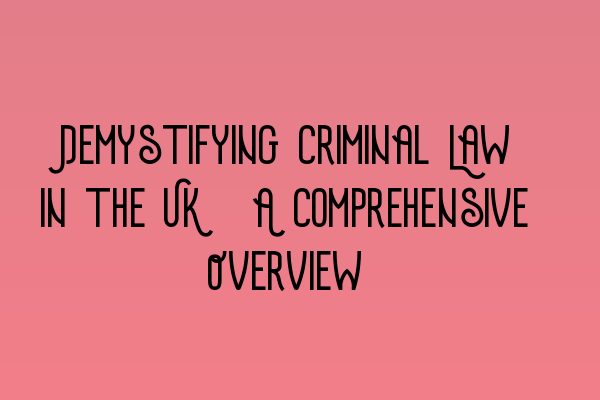Demystifying Criminal Law in the UK: A Comprehensive Overview
Criminal law is a complex and integral part of the legal system in the United Kingdom. It governs the prosecution and punishment of individuals who have committed crimes. Understanding criminal law is essential not only for legal professionals but also for anyone who wants to have a grasp of their rights and obligations in society. In this comprehensive overview, we will dive deep into the intricacies of criminal law in the UK, shedding light on its key principles, procedures, and the different types of offenses.
Key Principles of Criminal Law
Before delving into the specifics, it is important to establish a solid foundation by understanding the key principles that underpin criminal law in the UK. These principles include the presumption of innocence, the burden of proof resting on the prosecution, and the requirement for criminal offenses to be proved beyond reasonable doubt. These principles aim to protect the accused and ensure that the correct verdict is reached based on substantial evidence.
Elements of a Criminal Offense
To establish whether an individual has committed a criminal offense, certain elements must be present. These elements typically include the actus reus (the guilty act) and the mens rea (the guilty mind). The actus reus refers to the physical act or omission that constitutes the offense, while the mens rea relates to the mental state or intention of the individual at the time of committing the act. Understanding these elements is crucial in determining whether a crime has been committed and to what degree of culpability.
Types of Criminal Offenses
Criminal offenses in the UK can be categorized into several broad categories, such as violent crimes, property crimes, drug offenses, and white-collar crimes. Each category encompasses a wide range of specific offenses, and the penalties associated with them vary depending on the severity of the crime and other contributing factors. It is essential to have a solid understanding of the different types of offenses, their elements, and potential defenses to ensure effective legal representation or knowledge of one’s rights.
Criminal Procedure in the UK
The criminal justice system in the UK follows a well-defined procedure to ensure fairness and due process. This includes the investigation stage, arrest, charging by the Crown Prosecution Service (CPS), bail, and ultimately, the trial. It is crucial for both legal professionals and individuals involved in a criminal case to be aware of these stages and the rights afforded to the accused, such as the right to legal representation and a fair trial. Being well-versed in criminal procedure can significantly impact the outcome of a case.
Legal Resources and SQE Exam Preparation
Having a solid understanding of criminal law and practice is essential for legal professionals in the UK. If you’re looking to pursue a career in criminal law or wish to enhance your existing knowledge, it is crucial to stay updated and continually educate yourself. Preparing for the SQE 1 Practice Exam Questions and SQE 1 Practice Mocks FLK1 FLK2 can help you hone your skills and knowledge in criminal law. Additionally, undertaking SQE 1 Preparation Courses and SQE 2 Preparation Courses can provide you with comprehensive insights into criminal law and prepare you for the SRA SQE Exams.
In conclusion, criminal law in the UK is a multifaceted and vital aspect of the legal system. Whether you’re a legal professional, a student, or simply interested in understanding the intricacies of the law, it is crucial to have a comprehensive overview of criminal law and its various elements, types of offenses, and procedural aspects. By staying informed and continuously learning, you can navigate the complexities of criminal law successfully and contribute to upholding justice and fairness in society.
Disclaimer: The information provided in this article is for general informational purposes only and should not be construed as legal advice. For specific legal advice regarding your case, please consult with a qualified criminal law solicitor.
